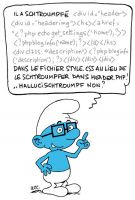Towards Geek Polities?
 The other day, after being asked to contribute as a tutor for freshers, I had a nosey sneak through the faculty freshers' handbook. Besides being filled with answers to freshers' refreshingly naive and silly questions, this handbook struck me by its constant referring to computing: procedures to be performed by e-mail, documents to download from the uni intranet, etc. There was even a note reminding on the basic polity when communicating with lecturers by e-mails. This came as a shock for me. In my not so ancient times, I never ever communicated with lecturers by e-mail. On the other hand, I remember much personal panicking at the prospect of a chat during a lecture break, my silences while sharing a coffee with a 'professor', and, sweating while giving a polite, yet firm - well itwas aimed so - knock on the office door.
The other day, after being asked to contribute as a tutor for freshers, I had a nosey sneak through the faculty freshers' handbook. Besides being filled with answers to freshers' refreshingly naive and silly questions, this handbook struck me by its constant referring to computing: procedures to be performed by e-mail, documents to download from the uni intranet, etc. There was even a note reminding on the basic polity when communicating with lecturers by e-mails. This came as a shock for me. In my not so ancient times, I never ever communicated with lecturers by e-mail. On the other hand, I remember much personal panicking at the prospect of a chat during a lecture break, my silences while sharing a coffee with a 'professor', and, sweating while giving a polite, yet firm - well itwas aimed so - knock on the office door.
Nowadays, in order to keep with the flow of modern life, one has to become a bit of a geek, that is computer literate enough to use computers towards shopping or paying bills. Those who do not cultivate a minimum level of geekiness, or don't have the means to join in this modern spirit for not having a computer at home, miss out on the opportunities only available on-line, such as discounts on electricity bills thanks to opting for paperless bills. They suffer from the socially disruptive Digital Divide. As recently reminded to me by the recent TIRO study on teen uses of the web, ![]() today, geekiness is a social, cultural and even intellectual duty. Geeks have their journals and forums, and intellectuals and academics meet up through mailing lists, and forums too, forums like that of the Vintage Computer Forums. In fact, everybody goes on-line: aristocratic families, sports and book fan clubs, political parties, even presidential candidates. We may tend to normalise it, but cyber-practices are more than ever at work remodelling modern societies from within through the cyberisation of shopping, of communicating, of writing, of enjoying arts, etc. Individuals' computer addiction
today, geekiness is a social, cultural and even intellectual duty. Geeks have their journals and forums, and intellectuals and academics meet up through mailing lists, and forums too, forums like that of the Vintage Computer Forums. In fact, everybody goes on-line: aristocratic families, sports and book fan clubs, political parties, even presidential candidates. We may tend to normalise it, but cyber-practices are more than ever at work remodelling modern societies from within through the cyberisation of shopping, of communicating, of writing, of enjoying arts, etc. Individuals' computer addiction  was in my opinion already a worrying phenomenon. Now it is society as a whole that is getting increasingly attained by a similar computer addiction. Somehow it's got good points - cheaper flights, more transparent public and economic policies for instance. It's got problems too. What is friendlier? An electronic birthday card received on time or a late paper one received by post? What teaches you more about life? E-mailing a lecturer's e-mail address or negotiating your way through facing him face to face to ask for some supervision time?
was in my opinion already a worrying phenomenon. Now it is society as a whole that is getting increasingly attained by a similar computer addiction. Somehow it's got good points - cheaper flights, more transparent public and economic policies for instance. It's got problems too. What is friendlier? An electronic birthday card received on time or a late paper one received by post? What teaches you more about life? E-mailing a lecturer's e-mail address or negotiating your way through facing him face to face to ask for some supervision time?

